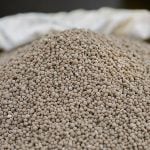
Tag Archives soil health

Save your yield on eroded knolls
Erosion often steals yield from hilltops and knolls in the field: Here are some ways to get it back

Soil carbon measurement and verification system launched
CANZA project to give producers quick, cost-effective tool to help measure, manage and monetize soil carbon

Retired cattle producer focuses on soil biology
Beef producer from South Dakota says his soil health recipe for success includes a mix of long-term no-till farming and cover cropping

New tool for carbon footprint tracking unveiled at Manitoba AgDays
FCC says the tool is a ‘non-judgemental’ way of getting a snap shot of soil carbon including sequestration

COMMENT: Fertile land for growing vegetables is at risk — but a scientific discovery could turn the tide

Humalite maker to broaden base
Alberta’s WestMET group is acquiring fellow humic acid company Black Earth

Trailblazing regenerative agriculture certification: FEATURE STORY
Official regenerative certification programs are out there; will it ever translate to farmers getting paid more?

Focus on soil health can arm against salinity
Soil health speakers urge farmers to avoid bare ground, test with soil health in mind

South Dakota farmer focuses on soil biology
Retired farmer Rick Bieber spoke at the Western Canada Conference on Grazing and Soil Health



